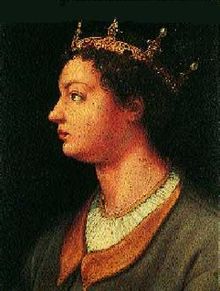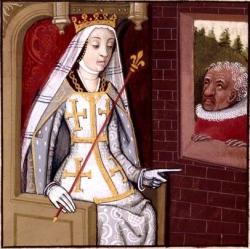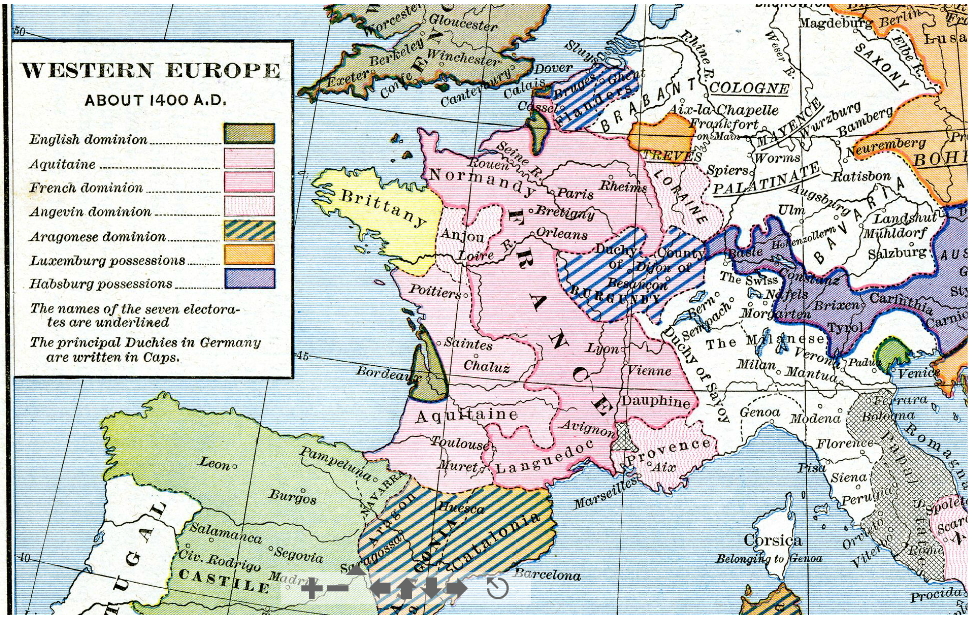Poor France, so far from God and so close to England
Since the conquest of Naples by King Charles of Anjou Provence had more often than not been attached to that southern kingdom. Provence itself, as the core of the old kingdom of Burgundy, had along with Lotharingia been attached to the Carolingian kingdom of Italy as part of Middle Francia, and one king of Provence even held the Italian throne in the 9th century. Having usurped Naples, conquering Provence as well was hardly too much for the Visconti; in any case, Provence was rich, close at hand, and vulnerable. Strategically, if the Visconti could conquer the French holdings east of the Rhone, it would give them and their allies control of a broad swathe of territory stretching from Marseilles to Flanders, a revived Middle Francia axis poised to resist both the French and the German kings. Contemporary correspondence between Turin and Milan reveals Visconti offered to cede Provence “and all other gains in the lands of the Gauls” to Count Amadeus in exchange for the Savoyard's Italian holdings, and even hinted that Pope Benedict might be persuaded to yield the crown of Arles-Burgundy.
Gian Maria besieged Marseilles in early November. A winter campaign was unusual, but in sunny Provence winter was comparatively mild, and by year's end the city- utterly unprepared for war- finally surrendered. Queen Joanna was freed from her prison and formally adopted Filippo Maria as her heir; Provence itself was claimed by Gian Maria by right of conquest. Gian Maria was hardly a savvy political operator, but Gian Galeazzo had not invested years of effort into his heir for nothing: Gian Maria quickly established himself as master of the city, installing a podesta and courting the merchants and artisans. The wealth of Provence enabled the Anjou's Italian ambitions, and Gian Maria offered to lift the hated taxes imposed by the ambitious Louis to fund his schemes. He also empowered the city council, offering them the right of self-governance in local affairs and the right of the commoners to direct appeal to the king- namely himself- against even the rural aristocracy. The landed nobility he crushed ruthlessly, installing new men- condotierri of Swiss, Italian, German, and even French origin- in their place. By the end of January Gian Maria felt secure enough to depart the city, leaving behind a moderate garrison under the formidable mercenary Muzio Sforza to secure his rear.[A]
In Iberia king Louis rapidly proceeded in his conquest of Aragon, advancing to the gates of Valencia- stronghold of the Castillans- and besieging the great port city. Ferdinand himself was defeated again when he attempted to relieve it, and Louis' counteroffensive effectively conquered Murcia for the Anjou. The desperate Ferdinand reached out to Milan, offering to recognize the loss of Sicily and even cede Catalonia if the Visconti would only support his war in Aragon. Gian Galeazzo remained noncommittal, but he did dispatch a Pisan fleet to seize Mallorca, which was accomplished in early April 1411. The Baleares were well positioned as a staging ground for any further intervention in Iberia, and every day the civil war continued on the mainland was another day for Filippo to consolidate in Naples, and Gian Maria to conquer in Provence. In June the Pisans raided the harbor at Barcelona, setting fire to the Catalan navy and absconding with every bit of movable wealth they could get their hands on.
Prince Henry roused himself from Bordeaux in early February as the spring thaw set in, striking southeast with the intention of seizing Armagnac. His ultimate goal was to position himself to intercept the Anjou should they return over the mountains, and also to support the Italians if they proved cooperative. Gian Maria Visconti and Henry Lancaster met just north of Toulouse on March 6th, 1411 to discuss a common strategy and a potential marriage alliance[1], and in so doing sealed the fate of France.
Thereafter Gian Maria sent the bulk of his forces south to guard the passes against Aragon, while Henry and the English besieged Toulouse. Seat of the former counts of Toulouse, the city was annexed by the French kings along with the rest of the County's territory in the wake of the Albigensian Crusade. From the reign of Philip Augustus it was the policy of French rulers to integrate the realm's great estates into the royal demesne, either as crown fiefs or as appanages for younger sons of the monarch. Languedoc, with its tradition of rebelliousness, remained a crown fief, as the French kings preferred to land their sons closer to Paris where they could keep an eye on them. This policy aided in curtailing the great magnates of the realm, but it also meant that there was no notable feudatory prepared to meet the invasion.
As Henry anticipated, the Siege of Toulouse drew the French armies south to oppose him. Duke Charles of Orleans and Arthur de Richemont, brother of the Duke of Brittany, rode to relieve the city. Estimates of the French army's size vary, but most agree that it was considerably larger than Henry's force, numbers of twenty to twenty five thousand generally given in most accounts. Henry immediately abandoned the siege and fled back towards Bordeaux, but he did so erratically, as if in a panic. Henry left behind detachments of cavalry to fight a desperate rearguard action, and even allowed loot and personal effects from his baggage to fall into the hands of the French. Duke Charles, believing the Italians to have departed south, gave pursuit in full confidence of their imminent victory, but on April 4th 1411, as the French army was crossing the Garonne, a combined Anglo-Italian cavalry force attacked them the rear. Gian Maria had shadowed the French from Bordeaux and achieved total surprise. Although the French outnumbered him nearly ten to one, their army- split by the river, and spread out in a loose column- panicked and routed incoherently, thousands plunging to their deaths in the torrid waters in their haste to escape the enemy. Henry, less than a day's march away, promptly turned about and marched back, dogging the French as far as Poitiers and killing and capturing many more. Among the slain was Arthur of Brittany, swept off his horse by the river and dashed against the rocks and drowned, while Duke Charles himself was captured by the English in the rout.[b*]
In the north, Duke John of Burgundy also marshalled his forces in the name of King Charles. His target, however, was not English territory or even French lands, but an Imperial prince: the vast and diffuse Anjou inheritance happened to include the inheritance of the duchy of Lorraine, as Louis second son Rene was pledged to Isabella of Lorraine, Duke Charles' eldest daughter and heir.
The duchy of Lorraine sat directly between the Burgundian Netherlands and the Duchy of Burgundy itself. Duke John attempted a match between Isabella and his second son John[C], but Charles ultimately sided against Burgundy. Now, however, both the Holy Roman Empire and France were in turmoil, and however mighty Louis of Anjou may be he was very far away. On May 19th 1411 Duke John marched into Lorraine with an army, and therefore doomed France to utter catastrophe. With this action the Burgundy-Armagnac feud, extant since the murder of Duke Louis of Orleans four years prior, finally erupted into open warfare. A competent king may have restrained his bannermen, but the king was mad, and his heir only fourteen years old and helpless in the face of the overmighty dukes grown rich on the kingdom's dime. France, at war with three of the greatest kingdoms in the west, was now at war with herself as well.
Referring to the ensuing calamity as a civil war does not adequately convey the sheer scale of the disaster. In the terrifying years following 1411, France ceased to exist as anything more than the battleground of selfish princes. The king lived, but he did not rule; there was no courtly intrigue, no scheming by ambitious aristocracy, no foreign invasion opposed by force of arms; what France endured was nothing less than the complete disintegration of all semblance of law, order, or Christian decency as every man, every woman, and every child, from the king and queen to the lowliest peasant, was forced to fight for their very survival, a war of all against all that bled France white.
First came the Englishmen to eat all my swine,
Next came the Kings' men to make my sons fight,
Next came the Angevins to make my wife whore,
Next came the Burgundians to burn down my home,
Then came the Italians who stole the clothes off my back.
I have naught but my life, and now the Englishmen come back to rob me of that.”[D]
Toulouse was the first to feel the flames of total war. The city, believing itself saved, soon learned of the return of the English from panicked farmers fleeing their advance. Gian Maria paraded the Duke of Orleans naked in front of the walls, whilst his soldiers hurled cruel insults and the severed heads of dead Frenchmen at the horrified inhabitants. The allies rapidly reestablished their siege, and after three grueling weeks of bombardment the city's southern wall was breached and the English and Italians stormed through.
What followed was an utter cavalcade of violence. Gian Maria and Henry gave their soldiers full license over the defenseless cityfolk, promising three days of unrestricted rape and pillage as reward for the assault. Nuns were stolen from their cloisters and gangraped in the streets; the great cathedral of Toulouse was looted and burned, its stained glass windows shattered and the nave torn apart by the frenzied soldiers in their haste to pry away its gold. “The Lombards split babes from their mothers' bellies and dismembered boys as young as nine for sport,” wrote the archbishop lamentingly, “they tortured doughty old merchants for copper pennies and gambled on how long the alderman might live after crucifying him in the public square. So many maids were raped that as many children were born ithat winter as were buried in spring. Not since the Crusade of Simon de Montfort did Langedoc suffer such misery.” On the second day a fire broke out in the city's river district and the soldiers withdrew and watched as the city burned; ash from the fire supposedly fell as far as Marsailles. Out of a pre-war population of perhaps as many as fifty thousand, the city hosted less than fifteen hundred gaunt and weary souls the following year, its streets, once rife with commerce, given over to weeds, ash and moldering bones.
Toulouse was but the beginning of France's woes. After the defeat of Duke Charles there remained no French army in the south capable of opposing the English advance. Had even one of the three great families set aside their quarrels, they might have forced Henry to withdraw; but Louis, either because he was ignorant of what transpired across the mountains, or because he valued his own crown over lands that owed him nothing, opted to complete the conquest of Aragon before crossing the mountains, and neither the Orleans nor the Burgundians would even entertain a truce whilst Lorraine remained between them.
In July of 1411 Count Bernard VIII of Armagnac marshalled his supporters and marched from Paris- not south against the invaders, but east against Burgundy. Numbering between twenty to thirty thousand Bernard's force represented the last men available to the Armagnac in the north, and their lives were casually and cruelly spent when he attempted to force the Meuse in August, losing over three hundred soldiers in the process. He tried again twice more before giving up, withdrawing back to Paris. In his wake nearly a thousand French corpses littered the fields of Lorraine, lives France simply could not afford to waste so frivolously.
In the wake of his victory Duke John advanced into Champagne, capturing the city of Reims on August 31st and Troyes on October 15th. Reims was a ceremonial capital of the old Carolingian kings, and their Capetian successors frequently used it as the site of their coronation; Troyes, strategically situated at the convergence of ancient Roman roads, was the greatest entrepot for overland commerce between Italy and the Low Countries. Champagne as a whole had largely been spared the ravages of war, by stint of being far removed from Aquitaine, Normandy, and the Atlantic coast, and securing the wealthy province made John far and away the most powerful of France's nobility- if not the most powerful, not discounting even the king.
King Charles, despite his madness, seems to have grasped something of the enormity of the crisis. Contemporary accounts record the king weeping in his chapel; “Piteous France,” he allegedly exclaimed, “so far from God and so close to England!” As the campaign season wound down for the fall Henry completed one last raid, striking out from Bordeaux with his cavalry. Crossing the Loire as the first grasp of winter caught France in its deadly embrace Henry and his raiders set northern France ablaze; from Angers fields to Rouen in Normandy, the country burned. “The Englishmen burned everything, everything!” A Norman chronicler mourned bitterly, “had they Satan's sorcery as well as the devil's luck they would burn even the Seine and leave France a desert.”
Gian Maria, meanwhile, struck south from Toulouse, reuniting with his army outside Narbonne as Henry was despoiling Normandy. His soldiers- as Condottieri were wont to do- had passed the time pillaging the countryside, sacking Narbonne itself and burning all of the lands at the foot of the Pyrenees. Gian Maria, after consulting with his commanders decided to withdraw back to the Rhone. If Louis of Anjou wanted to fight, then he could fight in Provence. The Italians did not continue to Marseilles after crossing the Rhone, however: instead they turned north, following the river on its left bank.
Lyons, situated at a key river crossing, was the northernmost portion of a swathe of territory stretching between the Rhone and the Alps known as the Dauphine. As with Provence to the south these lands were nominally imperial fiefs, and as with Provence the French gradually eclipsed Imperial power in the region over the course of the 13th and 14th centuries. The last ruler of the Dauphine pawned his territories to France in 1344, extracting promises of considerable autonomy, and the pledge that the Dauphine would be held not as a fief or a crown land but by the king's heir, henceforth to be styled the Dauphin of France. Although French rule was not contested neither was it particularly strong, as the region was largely neglected by Paris in light of their ongoing struggles with England and the distance between the Dauphin and Paris. Consequently the region was rather lawless, given over to the anarchic rule of petty aristocrats and prince bishops... or at least, such was its condition before France collapsed under the English onslaught. In a bitter irony, this lawless, remote province was the most peaceful, the most loyal, and the most secure in its devotion to Charles; that Gian Maria won this land, the only province of the kingdom willing and able to discharge its duties to France, merely by entering it with an army soberly reveals the dire circumstances France found herself in during the long and horrid campaign of 1411.
Gian Maria's reputation preceded him, and Lyon immediately surrendered rather than face the wrath of the Italians, and Gian Maria moved quickly to secure the city and all other major crossings across the Rhone. His prudence proved well founded, for in October of 1411 Ferdinand finally capitulated to Louis of Anjou. In the treaty of Zaragoza, Ferdinand renounced his claim to the throne of Aragon, and betrothed his daughter Maria to the nine year old King Louis I. This naturally annoyed Count James of Urgell, but with Aragon and Anjou reconciled he could do little and in any case he was mollified with the fief of Rousillon.
With the war in Aragon concluded Louis finally crossed the Pyrenees, marching to liberate Provence with a combined Franco-Catalan army. The final, inevitable clash of the Italian invasion was about to begin.
[1]Gian Maria did not yet have any children nor any unmarried siblings, and neither was he willing to break the Savoy betrothal; however nobility were accustomed to arranging marriages even for children yet to be born, and the potential for a future match was a natural point of disussion between the two men.
[A]This is the father of Francesco Sforza, the Condotierri who in OTL seized Milan after the death of Filippo Maria and the subsequent chaos of the short lived Ambrosian Republic.
[b*] Some men just get no luck. Charles was captured at Agincourt OTL and spent the next twenty five years as a prisoner in England. On the plus side he wrote some great poetry in captivity.
[C]OTL John had only a single surviving son, Philip the Good, TTL he has two
[D]This is based almost verbatim on an anonymous poem from the Thirty Years War. OTL the Hundred Years War was rather nasty for the French- the English chevauchees were especially harsh for the civilians, by design- but TTL the war is even worse as France collapses entirely into roving bands of armed and desperate men.




